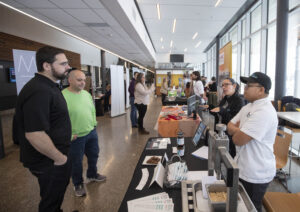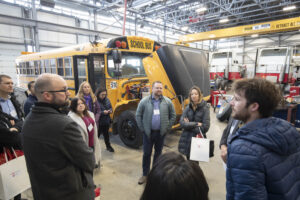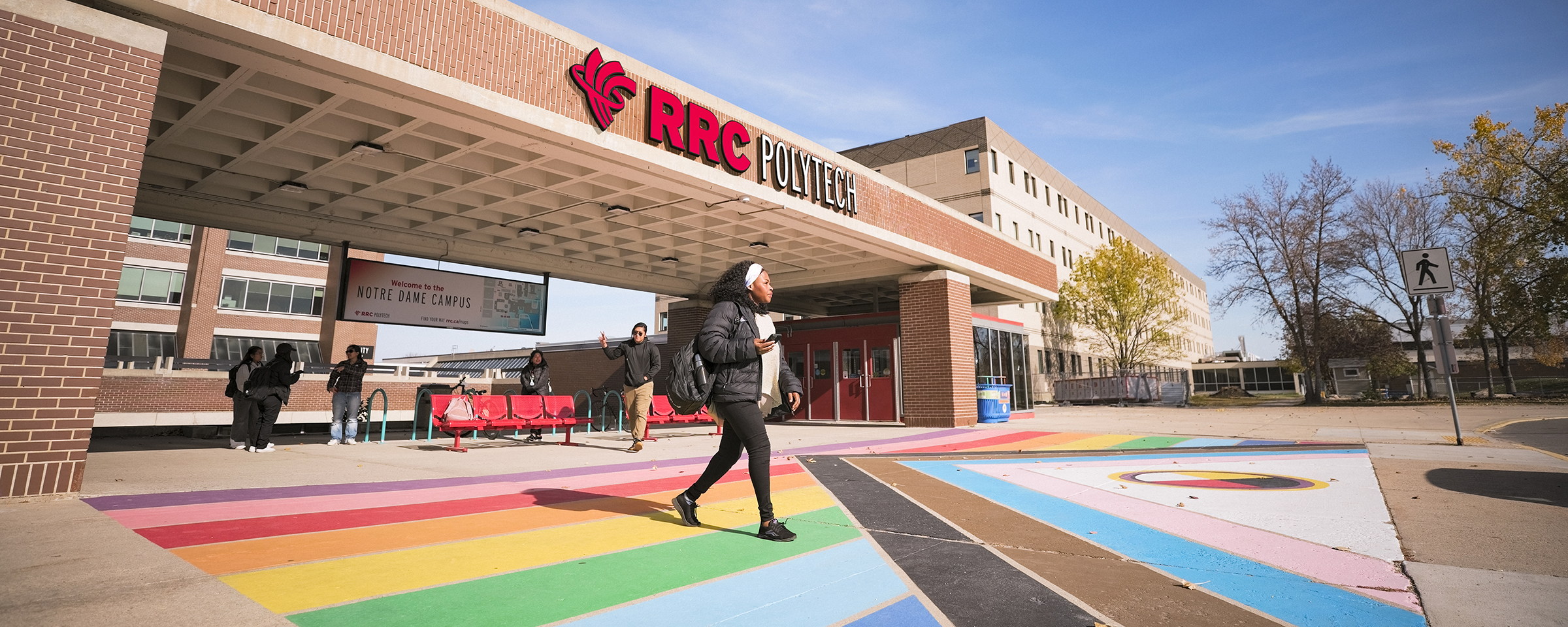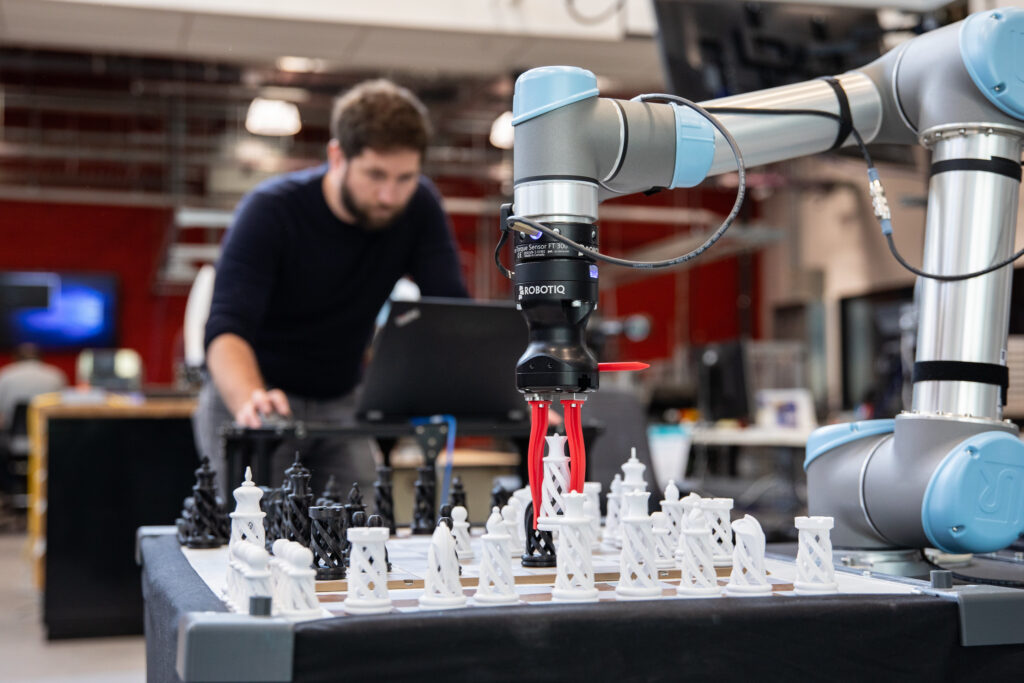RRC Polytech celebrates 20 years as industry’s gateway to applied research
RRC Polytech welcomed Manitobans to the Notre Dame Campus today, as part of the 20th anniversary celebration of its Research Partnerships & Innovation (RPI) enterprise.
A gateway to applied research since its establishment in 2004, RPI connects industry and community partners with RRC Polytech’s comprehensive array of facilities, technology and expertise in collaborative projects that bring innovative ideas to life.
As part of the event, guests toured RRC Polytech’s research labs and areas, saw demonstrations of its leading-edge technology and engaged with faculty, professional research staff and students to learn how applied research projects connect all areas of the College and are driving our province into the future.
“As Manitoba’s polytechnic, RRC Polytech is committed to creating change through innovation and using the knowledge and tools that we offer to benefit our communities and the industries that our graduates will soon be leading,” says Fred Meier, RRC Polytech’s President and CEO.
“Applied research projects drive progress while providing students with invaluable experience through work-integrated learning. We’re eager to build on the incredible success stories we’ve shared with our partners over the last 20 years and to explore new opportunities to find solutions for real-world challenges.”
With 135 researchers and more than 600 students directly involved annually, along with applied research training enabled by research infrastructure in more than 60 courses, RRC Polytech is consistently named a top research college in Canada.
The College’s three NSERC-funded Technology Access Centres (TACs) and other various research facilities and resources are focal points for advancing knowledge, fostering collaboration and accelerating commercialization — with thousands of square feet of space to develop, test and create solutions to support small, medium and large enterprises and communities.
 “We are proud to support RRC Polytech’s wide range of critical applied research projects because their creative collaborations with industry and community build on the strengths of the region and further diversify Manitoba’s economy to create opportunities for everyone,” says Dan Vandal, Minister of Northern Affairs and PrairiesCan.
“We are proud to support RRC Polytech’s wide range of critical applied research projects because their creative collaborations with industry and community build on the strengths of the region and further diversify Manitoba’s economy to create opportunities for everyone,” says Dan Vandal, Minister of Northern Affairs and PrairiesCan.
“Polytechnics not only train the workforce of tomorrow but also support businesses with access to state-of-art facilities and by providing guidance on the research and development of new processes and products in various stages of technology readiness levels. Twenty years is a tremendous milestone, and we look forward to their future successes.”
Projects range from the development of the world’s first all-electric tundra buggies for Frontiers North Adventures in Churchill and the testing of cold spray technology to repair aircrafts with StandardAero to supporting CancerCare Manitoba during the COVID-19 Pandemic and studying the Abecedarian Approach in child care to partnering with Opaskwayak Cree Nation to develop food products for their community, just to name a few.
In its 20 years of existence, RPI has driven Manitoba forward economically, environmentally, socially and culturally – positioning the province for success in a globally competitive environment.
“RRC Polytech’s two decades of helping small- and medium-sized enterprises in Manitoba grow and evolve through applied research that spurs innovation is cause for celebration,” says Hon. Mike Moroz, Minister of Innovation and New Technology.
“As a former educator, I also commend how the College includes students in research activities — while they learn. Technology and innovation shape all facets of our society and economy; we need workforces and communities that are fluent and confident in this environment and that learning begins in the classroom.”
 The applied research administered by RPI and conducted across all programs is foundational to RRC Polytech’s identity — a polytechnic is defined as an institution that fuels business innovation with applied research expertise. Applied research projects drive economic growth by helping to effectively and affordably solve problems for industry and communities, across all disciplines and sectors, as new products and processes are created.
The applied research administered by RPI and conducted across all programs is foundational to RRC Polytech’s identity — a polytechnic is defined as an institution that fuels business innovation with applied research expertise. Applied research projects drive economic growth by helping to effectively and affordably solve problems for industry and communities, across all disciplines and sectors, as new products and processes are created.
To date, RPI has completed thousands of projects for clients and continues to expand its areas of specialization to:
• Advanced Manufacturing and Mechatronics
• Cleantech with focus on EV and building efficiency
• Health, nutrition and social sciences with focus on culinary research and food innovation
• Early childhood development research
• Enabling adoption of digital technologies including AI and automation
“The emerging technology we’re helping to develop amplifies the growing interconnectivity between all sectors, so the future of applied research is dependent on taking a multidisciplinary approach,” says Dr. Jolen Galaugher, Director, Research Partnerships & Innovation at RRC Polytech.
“RPI is uniquely positioned to take a leadership role in strengthening Manitoba’s research innovation ecosystem through its strategic partnerships and by cooperating with other post-secondaries, regional and national research labs, government departments, and industry associations.”
RRC Polytech is the only post-secondary in Canada to deliberately group Research with Indigenous Strategy and Business Development (ISRBD) into one portfolio.
This ensures that our commitment to embed Truth and Reconciliation is always a priority and establishes that all applied research respects the principles of OCAP® (Ownership, Control, Access and Possession) when working with and in First Nations, Inuit and Métis communities. It also creates natural overlaps that accelerate the ability to maximize Indigenous growth opportunities across the province.
“RRC Polytech has been demonstrating what is possible in Manitoba for 20 years. We want to thank our generous funders and supporters, and of course, all of our partners for trusting us to help achieve their goals by transforming their ideas into reality,” says Galaugher. “We look forward to building on those relationships as together, we’ll create a prosperous, sustainable and inclusive future for all.”

